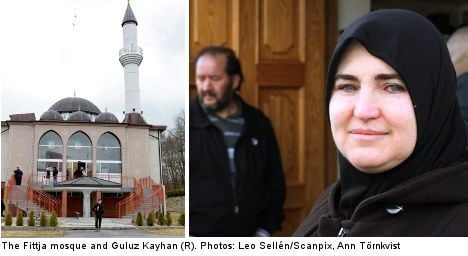Guluz Kayhan, 45, had tears in her eyes when the notes of Sweden’s first-ever call to prayer ended and worshippers hurried up the steps of the mosque.
“I don’t go to the mosque as often as before but I wanted to experience this,” she told The Local as she wiped tears from her blue eyes. Flanked by her two daughters, Kayhan made her way inside, slipping off her shoes.
“I’m really proud of Sweden,” said her daughters’ friend Havva Göcmenoglu, 24. “I am proud of being part of a society that respects different religions.”
Yet as the spring sun broke through the clouds after a bitterly dour morning, two men in a red Volvo 740 crept up to the curb and halted, just to spin their wheels so furiously the rubber shrieked as much as it burned. People making their way into the mosque turned their heads, but most seemed intent on ignoring the odd act.
The congregation was a mix of people who moved to Sweden from countries such as Turkey decades ago, but a number of people who immigrated more recently joined in too.
IN PICTURES: Historic first as Stockholm imam calls to prayer
Kashif Rashid, 28, from Lahore in Pakistan just left Italy to join his brother in Sweden.
“In Italy I didn’t even have a mosque to go to,” he said on his way to the mosque, which is nestled in a beech copse just by a lake lined with the hulls of hibernating boats.
“For two years I have not heard this,” he beamed.
His enthusiasm was shared by others heading to pray. Abdi Muhammad, 27, originally from Somalia, travelled to Fittja from Rinkeby on the far other end of Stockholm
“Thank you to the government,” he said.
Friday’s prayer call came following a decision earlier this month by local police who ruled that it wouldn’t violate local noise ordinances. The ruling allowed the prayer call for between three to five minutes on Fridays between midday and 1pm.
Back in September, local government officials had approved the move in principle, voting in favour of scrapping a 1994 prohibition on allowing prayer calls, which dated back from before the construction of the mosque.
The mosque was built in 2007 in the municipality’s Fittja district and has over 1,500 members
Among veterans in the congregation, reactions were equally elated.
“The Swedes have pure hearts,” said Fawzia Choudry, 46, who came to Sweden from Pakistan decades ago.
“We threw our hands in the air in delight when we heard the ruling, because at first nobody thought they’d give the permission.”
Her daughter Toba, 21, used the Azan (call to prayer) app on her pink-encased iPhone in the meantime.
“People are so busy working this really is a good reminder,” she said.
“This is so important for us Muslims and I think in general Sweden, alongside England, is much more tolerant than other European countries such as France.”
Ann Törnkvist


 Please whitelist us to continue reading.
Please whitelist us to continue reading.
Member comments